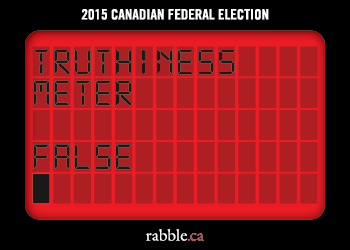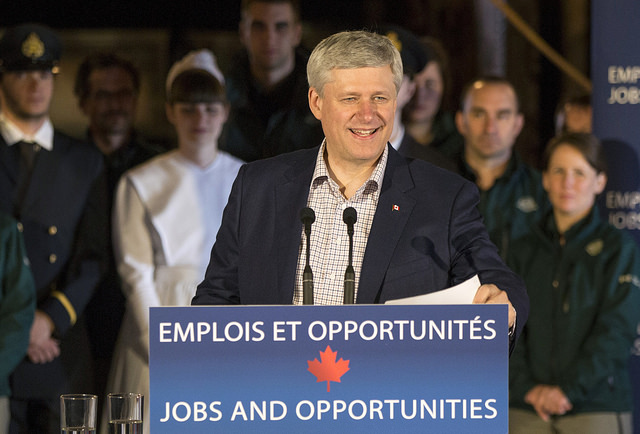Want to see an election campaign fact rich and spin poor? Chip in to keep our fact check blog up to date.
The claim: The Conservatives say the NDP budget will cost Canadians “at least” 250,000 jobs: 100,000 from an increase in CPP contributions and 150,000 more from an increase to the corporate tax rate. Is this true?
If the NDP is elected, is it true that “at least” 250,000 jobs will vanish?
The Conservatives have identified two areas in which the NDP’s plan to increase costs to corporations will hurt those corporations: increased payments to the Canada Pension Plan (CPP) and an increase to the corporate tax rate.
CPP: Payroll tax or common safety net?
Expanding CPP is not a payroll tax, as the Conservatives have tried to paint it. CPP is the common safety net to help retirees to live once their work-life is over.
Most Canadians support increasing the amount that corporations must pay for CPP. Unsurprisingly, the higher the income of a person, the less likely they are to support this expansion. They’re also less likely to need to use CPP thanks to good private pensions or RRSPs.
The Conservatives have floated the idea of having Canadians pay even more into CPP while corporations can maintain their same payments. It would effectively change how CPP works. The shift to individual-based, private mechanisms to fund retirement (like RRSPs and TSFAs) would undermine the collective base required to buoy the CPP — and is controversial even within the Conservative Party.
As economist Jim Stanford points out in an email, the CPP is an efficient mechanism to fund a public pension program. Opposition to it is purely ideological. “Small businesses, with the CPP doing a better job of meeting the retirement needs of their employees, will have less cost and hassle arranging for pension contributions,” he writes.
The Conservatives used a CFIB report to arrive at their 100,000 jobs warning. The report projected what they believe will happen if Ontario and P.E.I. introduce a provincial pension plan, with a 1.9 per cent new pension contribution. In both models, there are actually no job losses in the long term according to the CFIB’s own numbers. The Conservatives simply multiplied some figures in that study, used short-term projections and, voilà, came up with 100,000 jobs gone and a scary-sounding talking point.
Corporate taxes
The Conservatives reduced the small business tax rate to its lowest level in 25 years. This year’s newest cuts, announced in the Economic Action Plan 2015, will pull $2.7 billion out of the public purse in addition to more than $10.4 billion taken from Canadians’ collective tax base since 2008. Ninety-eight per cent of Canadian firms are considered to be small businesses.
The estimated 150,000 lost jobs comes from a report from CEO lobby organization The Canadian Council of Chief Executives where Jack Mintz, (professor, advisor to various Tories and member of the Board of Imperial Oil where he received $264,000 last year in addition to his salary as from the University of Calgary) claims that there are job losses associated with every corporate tax rate increase. Unifor economist Jordan Brennan demonstrates that there is no statically significant connection between a cut in the corporate tax rate and economic growth.
There has been steady growth in small business employment but there is little evidence the Conservatives’ deep tax cuts have encouraged small businesses to hire. Small businesses in Canada created more jobs in 2002-2004 than 2010-2013, demonstrating that other factors drive small business management to hire or not to hire.
And, as the CFIB members say in surveys, taxes are not the number one or number two obstacles for expanding their businesses: energy costs and demand are.
Could it be that a lobby organization representing CEOs whose primary goal is to protect corporate profits are making rhetorical, rather than economically sound arguments? In March, just as the economy started to contract, corporate profits reached a 27-year high.
Should workers be worried about their jobs if Mulcair is elected? Probably not, unless he goes after public sector workers in the same way that Harper has.
Verdict:

Want to see an election campaign fact rich and spin poor? Chip in to keep our fact check blog up to date.
Image: Flickr/pmwebphotos



